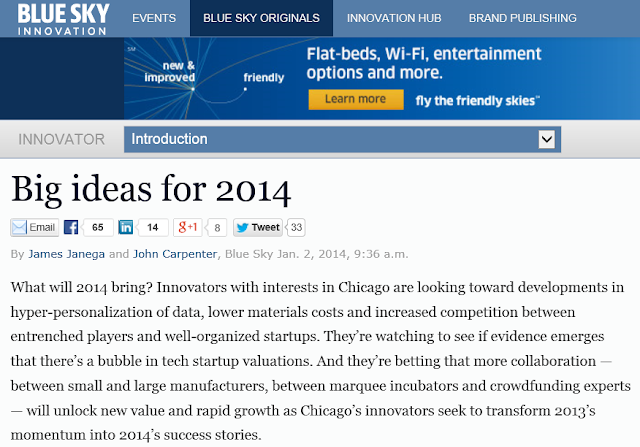Howard Tullman, incoming CEO, 1871
Incoming 1871 CEO Howard Tullman retired as a lawyer in 1980 to become an entrepreneur. In 2002, he was named president of Kendall College and turned the then-financially troubled college around, moving it to Chicago . He is the president and CEO of Tribeca Flashpoint Academy, a hands-on, apprenticeship training program in Chicago for the digital media arts. He served as longtime board chair of Cobalt Group, a buyer-insight platform for car sellers, and recently started his own venture capital firm, G2T3V, an early stage investment firm focused on financing and developing disruptive innovations in a portfolio of 15 companies that includes crowdfunder IndieGogo, the insurance claim streamliner SnapSheet, quiz site Social Crunch and group change management site Youtopia.
What he’s doing
Tullman said in an interview with Blue Sky Innovation that 1871's interest in an agreement signals a bet by Chicago startups that the
"People will be able to take an economic stake in the business," Tullman said. "We expect [that through crowdfunding]. they'll be able to fund at 10 times the current rate of angel investing."
Tullman also elaborated on his recent "up or out" remarks regarding 1871 startups. Among the other planned adjustments to the
The result will be an "emotionally honest" appraisal for entrepreneurs over whether they have chosen the right market, product, company fit and management team to be successful.
Many may decide to leave after those moments, Tullman said.
"I’m going to do them a favor," he said. "We’re not your parents."
What he's watching
In addition to crowd-funding developments at the national level and changes at 1871, Tullman is curious about developments on a variety of fronts:
Moving from diagnostic to prognostic data
"Before Facebook, the web was about links and anonymity. You could be a dog or a cat on the web. It was Facebook who put a stake in the ground and said you had to be who you are. It's almost become table stakes to know everything about you. It's become a cliché to mention that Wayne Gretzky quote, 'skate to where the puck is going.' But we're going to be spending our time trying to predict behavior. Technology will look ahead of you to guess your appetite for things that you are interested in. 2013 was about personal data. 2014 is about intent of purchase data. We want to be ahead of you using high-velocity computing power to put offers in front of you. We can look at the past, react to present, but we can change and influence the future."
Hyper-personalization, high-velocity computing, and automotive applications
"In Chicago, we happen to be the home of three leaders in parking-space locaters, SpotHero, Faspark and BestParking. This is an interesting new area for expansion and technology. A whole host of services will arise: the ability to track mileage, provide mobility services, do pathfinding and wayfinding.
"People are just figuring out to capture odometer information. This is the hardest data to collect, because it's crappy info. But if it were accurate, that would be valuable – it would say how much you use your car. Guys are trying to figure out how to get inside the black box to get that odometer information. Here's why: As each year goes by and cars become more fuel efficient, more electric, the entire road system of Illinois is dependent on the taxes that are extracted at the gas pump. In 48 months or less, we'll get a bill from the state for our road usage that's more like our water bill rather than trying to extract it from the pump. [Economists estimate] the states have billions in lost revenue because of better fuel efficiencies and electric cars. The guy who knows your odometer? He's the guy selling information to the states."
Mapping
"If you control the map, you control the game. Maps are how we make consumers smarter. People are using mapping software to track you in stores. That includes tracking your direction, dwell time at a specific location, and whether you move from display to purchase transaction."
Tailored insurance
"Insurance as an industry is inertia-based. Insurance as an industry is fat, happy, interested in maintaining the status quo, and eager not to disrupt it. But what we're seeing now is its whole world moving as banking did from tellers to ATMs. In the insurance space, we will see an enormous increase in two things: self-service, and an increased confluence of data that's now available on how we drive, actuarial information on insurance that will be offer consumers advantageously competitive pricing. We're trading privacy for money."

